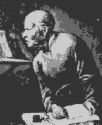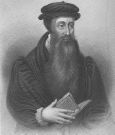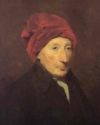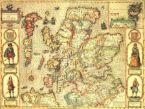
Edward Irving (1792-1834)- Theologian and Leader in the "Catholic Apostolic Church" 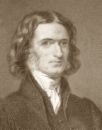 movement a Precursor to the Pentecostal/Charismatic movements. Ordained in the Church of Scotland, he became the assistant to Thomas Chalmers at St. John's in Glasgow. Even at this time he had a rather flamboyant style which did not appeal to the Scots and so he accepted a call to the Caledonian Chapel, a Scottish congregation in London. It was here that his ministry took off as the congregation of fifty soon jumped to a thousand. Edward held to a premillennial understanding of the book of Revelation and preached it fervently. The postmillennialist author and Banner of Truth founder, Iian Murray credits Edward with making premillennialism the dominant eschatalogical view of that time in his book The Puritan Hope. Edward soon came into controversy with his Presbytery, however, with statements he published of Christ's humanity. It seems that Edward held that although Christ is God, he took on "sinful flesh" just like every other man and was only able to overcome through the power of the Holy Spirit. Edward soon came to teach that we to could overcome sin through the power of the Holy Spirit. Edward at this point also came to accept glossolalia(speaking in tongues), prophecies and miraculous healing, believing these to be signs of the baptism of the Holy Spirit. Edward himself never exhibited any of these gifts but he welcomed their manifestation. When the General Assembly heard of this they locked up the building to Edward and the congregation worshipping there. After renting a location, his church formed as a congregation in the Catholic Apostolic Church. Edward would not lead the new group long as he came down with consumption and died even with the "healers" in his church. The movement is, however, still attributed to him as the followers of the movement are called "Irvingites". The movement eventually died down but similar movements in the Pentecostal/Charismatic movements still exist although there is no direct evidence of a link to the Irvingites. On a side note, it is often assumed that the pretribulational rapture doctrine was initiated by Margaret MacDonald , a prophetess in Edward's church, through a vision she had. There is however no evidence to connect a link from Margaret, whose vision is purported to have been in 1830, to John Nelson Darby who had written on this doctrine as early as 1827. This is usually perpetuated by vehemently anti-dispensationalists. Those who disagree with this view should earnestly endeavour to deal with it honestly and not bear false witness. For a good antidote to the charismatic teachings of Irving's church read Charismatic Chaos and Reckless Faith by John MacArthur and Satisfied by the Promise of the Spirit by Thomas Edgar.
movement a Precursor to the Pentecostal/Charismatic movements. Ordained in the Church of Scotland, he became the assistant to Thomas Chalmers at St. John's in Glasgow. Even at this time he had a rather flamboyant style which did not appeal to the Scots and so he accepted a call to the Caledonian Chapel, a Scottish congregation in London. It was here that his ministry took off as the congregation of fifty soon jumped to a thousand. Edward held to a premillennial understanding of the book of Revelation and preached it fervently. The postmillennialist author and Banner of Truth founder, Iian Murray credits Edward with making premillennialism the dominant eschatalogical view of that time in his book The Puritan Hope. Edward soon came into controversy with his Presbytery, however, with statements he published of Christ's humanity. It seems that Edward held that although Christ is God, he took on "sinful flesh" just like every other man and was only able to overcome through the power of the Holy Spirit. Edward soon came to teach that we to could overcome sin through the power of the Holy Spirit. Edward at this point also came to accept glossolalia(speaking in tongues), prophecies and miraculous healing, believing these to be signs of the baptism of the Holy Spirit. Edward himself never exhibited any of these gifts but he welcomed their manifestation. When the General Assembly heard of this they locked up the building to Edward and the congregation worshipping there. After renting a location, his church formed as a congregation in the Catholic Apostolic Church. Edward would not lead the new group long as he came down with consumption and died even with the "healers" in his church. The movement is, however, still attributed to him as the followers of the movement are called "Irvingites". The movement eventually died down but similar movements in the Pentecostal/Charismatic movements still exist although there is no direct evidence of a link to the Irvingites. On a side note, it is often assumed that the pretribulational rapture doctrine was initiated by Margaret MacDonald , a prophetess in Edward's church, through a vision she had. There is however no evidence to connect a link from Margaret, whose vision is purported to have been in 1830, to John Nelson Darby who had written on this doctrine as early as 1827. This is usually perpetuated by vehemently anti-dispensationalists. Those who disagree with this view should earnestly endeavour to deal with it honestly and not bear false witness. For a good antidote to the charismatic teachings of Irving's church read Charismatic Chaos and Reckless Faith by John MacArthur and Satisfied by the Promise of the Spirit by Thomas Edgar.
William Cunningham(1805-61)- Historian and Free Church Theologian, William succeeded Thomas Chalmers at the New College of Edinburgh as Principal. His magnum opus,the two volume Historical Theology , is essentially a systematic theology as in it he focuses on the debates throughout church history, presenting various sides and then presenting his view. It is because of this work that some consider William to be Scotland's greatest theologian. His theology is faithful to Westminster even to the point of criticising the Reformers themselves. Although he did not feel the difference between Westminster and the Reformers was as extreme as William Hamilton believed, William did think the Reformers statements on assurance were often "rash and exaggerated" and that their view was "erroneous". He was especially mystified by Calvin's definition of faith: "We shall have a complete definition of faith, if we say that it is a steady and certain knowledge of the divine benevolence towards us, which, being founded on the truth of the gratuitous promise in Christ, is both revealed to our minds and confirmed to our hearts by the Holy Spirit" and that it was generally though not universally received for the greater part of the century by protestant and reformed divines. Westminster on the other hand held a clear dichotomy between faith and assurance. William also disdained Calvin's view of the Lord's Supper saying that it was "altogether unsuccessful... as unintelligible as Luther's consubstantiation. This is, perhaps, the greatest blot in the history of Calvin's labours as a public instructor." William held to and defended Zwingli's view of the supper from those who said he held to a "naked and bare sign". William did, however, defend Calvin from the Amyraldists, stating that it is unfair to hold Calvin up on a position never put to him. William felt Calvin would have held to a definite atonement although some of his statements were ambiguous. Finally, William defended his predecessor Thomas Chalmers and Jonathan Edwards although disagreeing with both of them on their determinist views. Some were saying that their views were antithetical to the Westminster Confession with its chapter on "Free Will". William believed that the confession allowed for their view despite his belief that there is a difference between predestination and determinism. Another popular work by William is his The Reformers and the Theology of the Reformation.
John Murray(189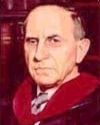 8-1975)- Theologian who taught Systematic Theology at Westminster Seminary in Philadelphia for 36 years. Although a systematic theology professor, John, following in the footsteps of his mentor Geerhardus Vos, preferred the discipline of Biblical Theology and incorporated this into the classes he taught. The discipline of systematic theology takes scripture as a whole recognizing that there are "hard sayings" (2Peter 3:16) in scripture that need to be interpreted in light of other less hard sayings. Biblical theology takes every verse, every word, at face value and pieces them together for a system. Systematic theology looks at the forest; biblical theology looks at the trees. Problems for systematic theology are systems built on presuppositions without Biblical precedence and inappropriate inferences from scripture which are unfounded. Biblical theologians however sometimes hold two contradicting doctrines in their system and live with the tension calling it a mystery because they believe both to be taught in scripture. Examples of this would be holding to predestination and freewill or salvation by grace alone but also baptismal regeneration. John's emphasis on biblical theology led him to deny a covenant of works which caused much debate and tension among his contemporaries. To John, a covenant of works was a contradiction in terms. John held that Adam, even in the Garden of Eden, would have needed God's grace not to fall. Despite this denial John did hold to the doctrines of original sin and the imputed righteousness of Christ but he did so at the cost of consistency according to his colleagues. So according to John there is just a covenant of grace contra Thomas Boston who held to a covenant of works and grace and John Cameron who held to a covenant of works, grace and redemption. John's most famous works include his 2 volume Commentary on Romans, Redemption-Accomplished and Applied and his book Divorce in which he defends the Westminster, Reformed and most importantly scriptural view that divorce is allowed only in the case of adultery or desertion and that re-marriage is allowed. For more on the "Covenant" debate see Covenant Theology in Reformed Perspective by Mark Karlberg or the works of Meredith Kline.
8-1975)- Theologian who taught Systematic Theology at Westminster Seminary in Philadelphia for 36 years. Although a systematic theology professor, John, following in the footsteps of his mentor Geerhardus Vos, preferred the discipline of Biblical Theology and incorporated this into the classes he taught. The discipline of systematic theology takes scripture as a whole recognizing that there are "hard sayings" (2Peter 3:16) in scripture that need to be interpreted in light of other less hard sayings. Biblical theology takes every verse, every word, at face value and pieces them together for a system. Systematic theology looks at the forest; biblical theology looks at the trees. Problems for systematic theology are systems built on presuppositions without Biblical precedence and inappropriate inferences from scripture which are unfounded. Biblical theologians however sometimes hold two contradicting doctrines in their system and live with the tension calling it a mystery because they believe both to be taught in scripture. Examples of this would be holding to predestination and freewill or salvation by grace alone but also baptismal regeneration. John's emphasis on biblical theology led him to deny a covenant of works which caused much debate and tension among his contemporaries. To John, a covenant of works was a contradiction in terms. John held that Adam, even in the Garden of Eden, would have needed God's grace not to fall. Despite this denial John did hold to the doctrines of original sin and the imputed righteousness of Christ but he did so at the cost of consistency according to his colleagues. So according to John there is just a covenant of grace contra Thomas Boston who held to a covenant of works and grace and John Cameron who held to a covenant of works, grace and redemption. John's most famous works include his 2 volume Commentary on Romans, Redemption-Accomplished and Applied and his book Divorce in which he defends the Westminster, Reformed and most importantly scriptural view that divorce is allowed only in the case of adultery or desertion and that re-marriage is allowed. For more on the "Covenant" debate see Covenant Theology in Reformed Perspective by Mark Karlberg or the works of Meredith Kline.
This completes my look at Scotland's legacy. This small sampling is not exhaustive by any means but these men for the most part represent movements, denominations, or doctrines which for good or bad have impacted the world. I realize no man is an island and these men all had help, but the Lord raised these men up in a special way. I have tried to be fair and objective in my presentation of these men's views, despite in some instances, my disdain for their theology. I want this to be the ground work for more extensive studies, later, as I refer to these individuals. I hope this look at Scotland's legacy has been informative and enlightening.
Soli Deo Gloria







